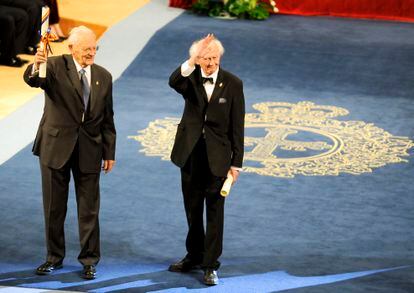The Bauman family spoke Polish at home and lived more or less the same as most of the other residents of Poznan, Poland.
But she wasn't Catholic and that had all the importance in the world.
“From the Polish point of view,” Bauman wrote in his private manuscript, “Poznan was a truly exceptional city.
There the virtual absence of Jews and the most vituperative anti-Semitic sentiments came together.
(…)
His status as "friendly prey"
As a child, from about the age of seven to thirteen, Bauman played the role of "friendly prey."
Its existence allowed other children, organized in groups, to carry out the "ritual of the persecution of the Jew" that empowered them to become "patriotic Poles".
As the most prominent feature of that nationalist identity was anti-Semitism, the boys demonstrated their commitment to the "defense of Polonity" by hunting down the Jew in the class.
(…)
More information
Bauman, the greatness of approaching ideas in a simple way
"The most traumatic of my encounters with those designated as my persecutors had a very strong influence on the rest of my childhood and forever rent the veil of false security," Bauman wrote to his daughters.
“Once, my mother, after having done the shopping, came to pick me up from school at the end of class.
Those who had the privilege of hunting me back then —two unemployed teenagers (…)— were there, in their usual position, and the four of us made our way back home.
On this occasion, the two of them remained a few steps behind, but otherwise their attitude seemed unaffected by the fact that my mother was present.
They diligently carried out the now traditional ritual and dedicated to me all the way the usual succession of sounds and expletives that was so familiar to me at that point.
I looked at my mother.
She kept me very close to her, but she kept her head down, her eyes fixed on the cobblestones on the ground and trying at all times not to look behind her, towards our companions.
Suddenly it dawned on me: my mother, the omnipotent and omniscient one, she had no power to defend me, she didn't know what to do!
She felt humiliated, she was afraid!
From that day and for many years, I lived in fear.
(…)
“Suddenly I realized: my mother, the omnipotent, had no power to defend me.
She was afraid! "
his mother's love
It was clear that Zofia Bauman was the driving force of the family, and that her son was all her happiness, as evidenced in the letter that Bauman wrote to her own daughters: “For my mother, I was the only company for most of my life. of the day and, perhaps, the only hope that life could still be more interesting and pleasant in the future”.
From my own interview with Bauman, I deduced that Zofia must have been an exemplary mother, educated, open-minded, curious and full of life, and also an excellent cook.
“In the kitchen, there was always a stove on, always hot, and my mother was cooking and I was sitting at the table in the living room, doing my homework, and at every step, while I was cooking, she would come up to me and say: 'Try this, honey '.
And her 'sweetheart' of hers tasted and fattened it up”.
(…)
Maturity and last days in Poland
On Monday, March 18 [1968], a short-notice strike at the university ended, and the rector closed the Philosophy Department building to keep out any mob.
The next day, Gomułka was scheduled to give a speech to the party section in Warsaw, and the whole of Poland was set to see him.
The students skipped classes and went home so as not to miss the speech.
The Baumans [Zygmunt along with his wife, Janina, and his two daughters] sat in front of their television accompanied by his friend Basia.
The speech was in the afternoon;
as they prepared for the moment, they recalled Gomułka's momentous words from 12 years earlier, which had awakened so much hope for a better future.
This time, however, they dared not get their hopes up too high.
(…)
Zygmunt Bauman (right) with Alain Touraine in Oviedo, on October 22, 2010, the day they received the Prince of Asturias Award for Communication and Humanities.
JAVIER SORIANO (AFP via Getty Images)
“Dear and respected comrades!”
Gomułka began: “In the last 10 days, important events have taken place in the country.
A large part of the student youth, both in Warsaw and in other academic centers of the nation, has been deceived and led astray by forces hostile to socialism.
These forces have sown in the students the troublesome germ of anarchy.
(…) We know that some [people], few in fact, especially employees of various faculties of humanities of the University of Warsaw, a group of researchers, have a special responsibility for recent events”, he said when he had already pronounced about three quarters of his speech.
between a
crescendo
He added: “These scholars, like Professors Brus, Baczko, Morawski, Kołakowski, Bauman and a few others we haven't mentioned yet, have been fighting the policies of our party for many years. from revisionist positions.
They have knowingly and deliberately poured hostile political views into the minds of young people;
they are the intellectual instigators of these alarming actions.”
At that point, the family stopped listening.
The two young daughters “looked at their father with fear.
Basia [Bauman's friend] hugged them both and, with tears in her eyes, told them: “Don't listen to this, girls!
It's all lies!"
(…)
Writing from exile in Leeds (UK)
Writing books was not always a joyful creative process for Bauman.
This highly valued world famous thinker was assailed by doubts about his work;
He had some difficult times that only the members of his environment closest to him got to know.
(...) His self-criticism was evident in the acid humor and the cynical replies that he sometimes addressed to himself and his work, and which betrayed a certain fragility and hesitation in reference to his writing activity.
“As he later explained, in a conversation with Alain Touraine in Asturias, he considered himself more of a follower than a leader or pioneer,” [Australian sociologist] Peter Beilharz wrote.
That low self-confidence was also evident in that comment that Bauman made to me in our first interview,
when he described himself as recycling "other people's ideas."
(…)
Bauman has still published dozens of books since the first time he declared that he had reached the end of his writing activity.
Beilharz explains: “Bauman, of course, played that game with me and with himself.
When he went to visit him more regularly, every year he gave me the manuscript of his latest book and told me that after that, they would not come anymore.
It was more than just a game.
On March 6, 1999, he wrote me to say that he was not sure if he would live long enough to finish
Liquid Modernity
”.
In the end, that book would mark the beginning of Bauman's worldwide fame.
Liquid Modernity
was the first book in a long series dedicated to
liquid
phenomena in various fields.
Liquidity
was the
basis for the construction of a postmodern theoretical framework.
It inspired changes of perspective in many people, as can be seen in how quickly the adjective
liquid
became a keyword that labels a whole new theoretical approach.
Zygmunt Bauman in Pordenone, Italy, in September 2007. Leonardo Cendamo (Getty Images)
His legacy
Zygmunt Bauman's work is, without a doubt, especially relevant to understanding the most important changes of the 20th century and the beginning of the 21st.
Bauman is a leading academic figure in sociology, philosophy, and cultural studies, and his work will be discussed and developed at conferences, symposia, and research institutes for years to come.
Bauman was an active author of books and articles for most of his life, and his work is varied in content, style, and form.
He wrote it and it was published in many languages and for many audiences.
Perhaps the best way to outline his legacy is to divide it into three great periods of intellectual activity: the Polish, the British, and the global.
(…)
With the publication of
Liquid Modernity,
Bauman entered his final period of activity.
It was the moment in which Bauman's work went beyond the academic framework and scientific conventions to reach a larger audience.
(…)
Academic teachers use Bauman as a link that allows them to communicate with students who are just beginning a university career in some field of social sciences or humanities.
Reading Bauman's books is all that many members of that audience need to learn how our society works.
Knowing this, teachers use Bauman as a reinforcing reference that can help build and frame an analysis with which to better understand the dynamic (liquid) processes of society.
These books from the last phase of the author are precisely the ones that best enable a connection between academic and non-academic work, a passageway between these two different audiences.
A change of public
Bauman's decision to change his reading public after his retirement paid off.
In a period in which various studies predict the early death of books, many of Bauman's are bestsellers that have been translated into 34 languages and break sales records among audiences that, it is said, are not able to concentrate as much. enough to read a single long story in a newspaper.
Who would have imagined that so many young people, apparently lost in a sea of electronic games, avatars, virtual love affairs, tweets, chats and the latest smartphones, would buy and enjoy so many of the author's books?
(…)
Bauman did not give recipes on how to live;
each of us had to find our own way: we could go on with our liquid lives or make changes to them.
Bauman also refused to predict the future.
He spoke of the present in relation to a past that he knew well.
The secret of his success as a convincing translator and interpreter of the contemporary age was undoubtedly connected to his long and rich biography, to his
longue durée
perspective on the twentieth-century European experience, to his own experience of repeated exile and distance.
Even so, Bauman would not agree with this hypothesis that links the intellectual with his life story and would say that, if it were true, he could only write about his own personal experiences.
Subscribe here
to the weekly Ideas newsletter.
Exclusive content for subscribers
read without limits
subscribe
I'm already a subscriber





/cloudfront-eu-central-1.images.arcpublishing.com/prisa/PBMVWQBLQRD6RCIWTKBVIUEINA.jpg)



